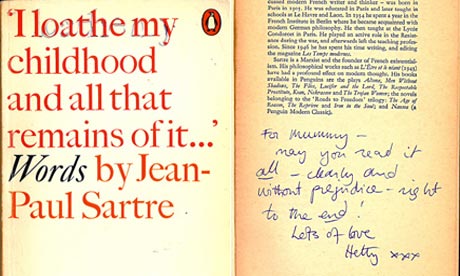
A combination of poor financial health and a penchant for attractive-but-discontinued cover artwork sees that the majority of my book purchases take place in secondhand shops. While I love the smell and the feel of cracking open a brand new book as much as the next person, I have to confess there is a certain frisson in reading something that is a little musty, well-thumbed, and battered round the edges. In fact, the idea that the book I am about to read has in all likelihood already been read a number of times by person(s) unknown is an immensely appealing one.
I love to think that the actual copy I hold in my hands has been a catalyst to someone else's imagination; has perhaps been loved or hated, brought consolation or comfort; perhaps has even changed somebody's life. Or perhaps, of course, it has done none of these things. Which is why it is all the more thrilling to find hard evidence of pre-ownership scrawled across the inside covers of these used books in the form of handwritten dedications. The dedications can range from the awkward scratchings of adolescent infatuation, to the resentful recriminations of a love affair gone sour, and offer fascinating glimpses into their books' own secret histories, imbuing them with an emotional resonance independent of the actual texts.
Undoubtedly, there is an element of voyeurism involved in this bibliophilic kink. I know that I am often reading something intensely private and intended for someone else's eyes. Also, books are arguably among the most intimate and loaded of gifts due to the time and concentration the recipient is required to invest in them. Often the choice of book coupled with the message within can suggest a narrative of its own. For example, a message inside a copy of Aharon Shabtai's poetry collection J'Accuse would appear to be from a jilted lover and is quite striking in its passive-aggressive tone ("hope you'll find the poet's work more accessible than my obscure efforts to say some similar things.") Meanwhile, the incongruity of giving George Orwell's 1984 as a romantic gift (with the clumsy reasoning "This book was published in 1949, it was about the future 1984. I have given it to you with love in 1994, the start of our future") makes it quite easy to draw one's own conclusions as to how that particular relationship panned out. In another case, the copy of Jean-Paul Sartre's Words given to "mummy" with the instructions that she "read it all without prejudice" appears to have been chosen with the cover artwork in mind, which bears the text "I loathe my childhood and all that remains of it". Ouch.
But, for me, the overriding emotion evoked by these inscriptions is one of pathos. All are basically records of human connections - or at least attempts at human connections - given added weight by the fact that all these books have been discovered among the shelves of second-hand book shops and for whatever reason they are no longer in the hands of the dedicees. Admittedly, this in itself can be blackly humorous: a copy of Quentin Letts' 50 People Who Buggered Up Britain is dedicated to "Paul" with the assurance that he "won't be the 51st" and wishing him "The very best of luck with the business." I like to think the fact that this dedication is dated as recently as 10 May 2010 says it all.
But when the book is a gift from a father to a son, explaining that Joyce Carey's Mr Johnson "had a profound influence on my life; without it I may never have gone to Africa, and you may not have been born 30 years ago. To it you probably owe your existence and it is high time you were introduced" then the knowledge that the son and this book have now been parted is one of almost unbearable poignancy.
And you won't get that with Kindle.

